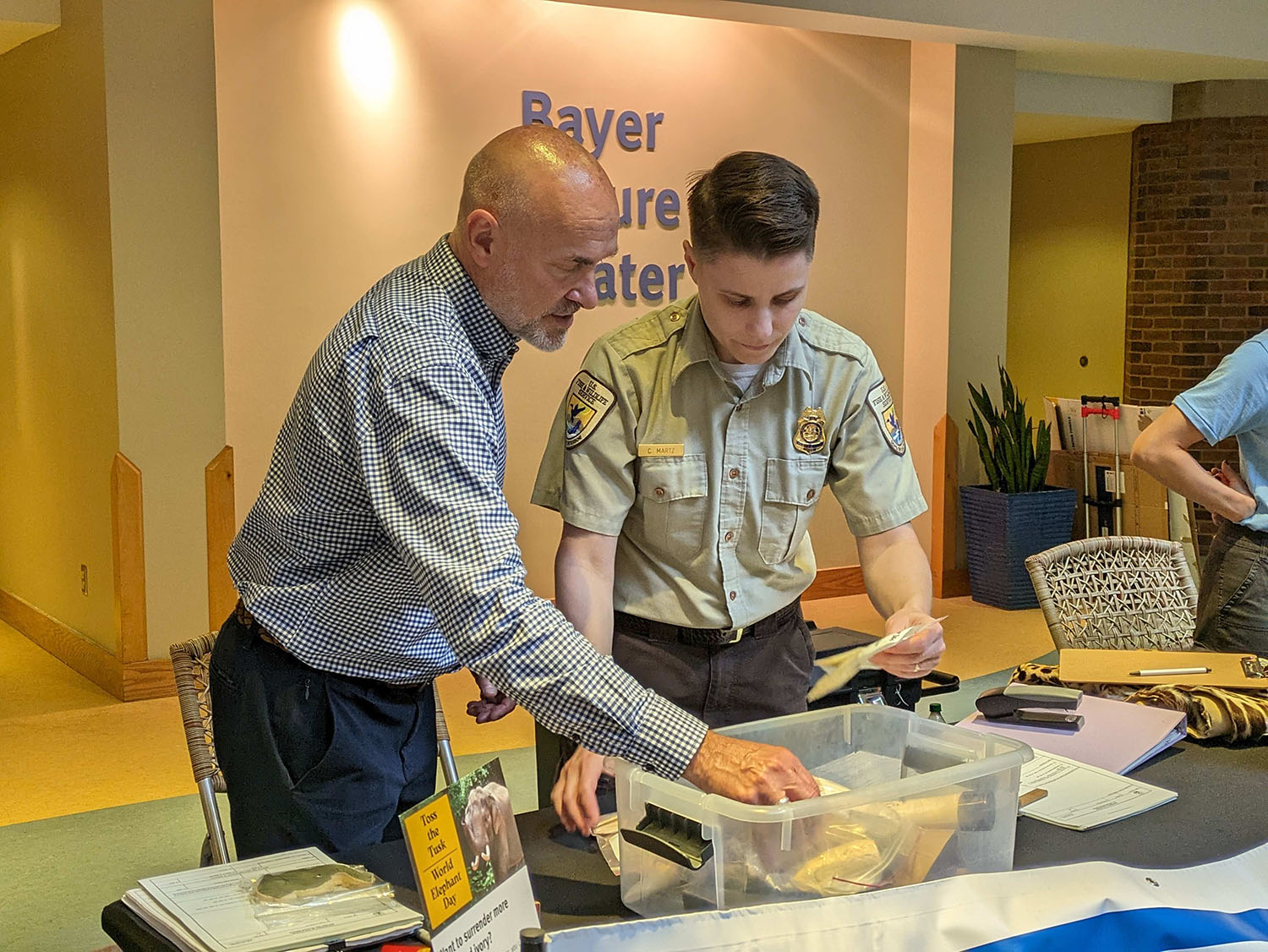The Association of Zoos and Aquariums’ Wildlife Trafficking Alliance has teamed up with the United States Fish and Wildlife Service (USFWS) to organize a series of Toss the Tusk ivory surrender events at AZA-accredited facilities in 2023. The hope is that these events will encourage people to engage in conserving elephants by surrendering any ivory, or other endangered animal products in their possession, and learning about the illegal wildlife trade.
“Elephants are iconic,” said Dan Ashe, president and chief executive officer at AZA. “There’s opportunity to take advantage of the empathy that elephants evoke and use them as the symbol for the larger challenge around wildlife trafficking.”
The first 2023 Toss the Tusk ivory surrender event was hosted by the San Diego Zoo Wildlife Alliance in San Diego, Calif., in March. Attendees included representatives from the USFWS, California Department of Fish and Wildlife (CDFW), and the AZA.
Toss the Tusk events provide people an opportunity to speak with wildlife professionals about the conservation challenges faced by elephants. The conversation, however, can go both ways.

“One of the most memorable moments of the event was when a woman came with Ziplock bags full of heirloom ivory that she had inherited from her grandmother many years ago. She described how emotionally tied she was to the items. Still, she knew she didn’t want to keep them because it made her sad for the elephants the ivory belonged to. She told the officers the stories behind several pieces, allowing her to honor her grandmother’s memory and intent in purchasing the ivory pieces,” said Sasha Stallard, associate director of Safari Park education at San Diego Zoo Wildlife Alliance.
[Related story: Toss the Tusk Event Held at San Diego Zoo Safari Park]
The event at San Diego Zoo Wildlife Alliance was a success, with 222 elephant ivory pieces collected, totaling approximately 25 pounds. Surrendering animal products like ivory ensures that those products will not end up for sale and further fuel the illegal trade.
“It’s all connected”, said Ashe. “Everyone can be an informed consumer and not contribute wittingly or unwittingly to the trafficking of wild animals.”
The second event took place on 11 August at the Saint Louis Zoo in St. Louis, Mo.
“What I really loved was the engagement and collaboration, not only among the Zoo team, but also externally with USFWS, Missouri Department of Conservation, and the AZA,” said Lisa Kelley, executive director at the Saint Louis Zoo WildCare Institute. “The energy was so positive … even though it was about poaching and trafficking. It’s hard to explain a topic like that in a family-friendly way.”
In total, 26 elephant ivory pieces were surrendered and there were 389 meaningful interactions with USFWS, the Zoo, Missouri Department of Conservation, and AZA staff.

[Related story: Toss the Tusk Event Hosted by the Saint Louis Zoo]
Future Toss the Tusk ivory surrender events will take place at the Oakland Zoo in Oakland, Calif., on 7 October and the Dallas Zoo in Dallas, Texas, on 20 October.
“When people relinquish items, they go from sitting in a box or drawer to doing good for animals,” said Adrienne Mrsny, conservation manager at the Oakland Zoo. “CDFW and the USFWS use these donated items to expand their DNA databases to assist with future trafficking cases and for educational resources.”
People who turn in their ivory products at these events can rest easy knowing that they’re contributing to end the illegal wildlife trade both in the U.S. and internationally.
Elephant conservation goes beyond our borders, as various zoos partner with range country organizations.
“We are hoping to engage our audience and help them understand that the Dallas Zoo is an international conservation organization, dedicated to saving wildlife and supporting community-based conservation efforts around the world,” said Chris Corpus, director of conservation at the Dallas Zoo, “We are closely involved in anti-poaching training efforts and wildlife trafficking reduction in South Africa.”
California has passed a law banning intrastate trade of ivory, but Missouri and Texas have yet to take this step.
“Zoos have a unique platform for speaking about these more complex issues and meeting the public on their different levels of knowledge and understanding,” said Mrsny.
Conservationists agree that halting demand for these products is one way to dismantle the ivory trade.

“The more we can reduce the desire for and the ability to traffic wildlife and wildlife body parts, the more we can help stop that funding stream for criminal organizations and save species from extinction,” said Corpus.
Stallard agreed, saying, “If we stop the demand for illegal wildlife products, the people sourcing these products will no longer have a reason to exploit wildlife for profit.”
Even if an individual doesn’t have any animal products to surrender, they are still encouraged to attend these events.
“People should attend so that they can celebrate with their family the joy of animal families while also learning about what they can do to save these magnificent animals,” said Kelley.
When asked if he could describe Toss the Tusk in one word, Ashe did not hesitate: Hopeful.
“Hope is an increasingly rare commodity in the world today,” he said. “These events give you a sense of accomplishment, contribution, and it’s the engagement with people that creates the hopefulness that is a rarer and rarer commodity.”
Back to All Stories
